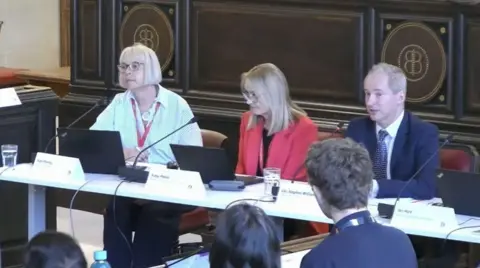Thousands of diseased ash trees to be cut down
 Bristol City Council/YouTube
Bristol City Council/YouTubeUp to 4,000 trees infected with a deadly disease that pose a risk to public safety will be felled or made safe after councillors allocated £2.8m for the work.
Bristol City Council has agreed to spend the money on felling ash trees that are in the latter stages of ash dieback - a windblown fungus that makes trees brittle - focusing on those that could collapse near roads and properties.
Part of the money will be spent on replacement tree planting, which will eventually increase Bristol's tree canopy, the council said.
The three Labour members on the public health and communities committee refused to support the plans while the other three parties voted in favour.
A report to the meeting said 10,000 trees owned by the council were in an advanced state of decline, with about a third of those identified as requiring urgent work.
The committee allocated £930,000 to chop the trees down and £1.9m for replacement tree planting, according to the Local Democracy Reporting Service.
The report said the work would result in a "short term" reduction in the city's tree cover and estimated it would take 15 to 20 years to return to current levels.
Public safety
Labour councillor Tom Blenkinsop said: "I'm struggling to get my head around 15 to 20 years being a temporary situation."
The council's head of parks and green spaces, Richard Fletcher, said the trees would be lost anyway as a result of ash dieback and not because of the decision to cut them down.
Liberal Democrat committee chairman Stephen Williams said the decision was down to public safety.
"We would be even more concerned if a branch fell on a bus, pedestrian or a cyclist."
Williams said he would write to the government to ask for money to deal with the disease because it is a national problem.
Follow BBC Bristol on Facebook, X and Instagram. Send your story ideas to us on email or via WhatsApp on 0800 313 4630.
